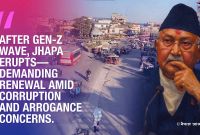Balen’s Facebook Fury: Is His War on the Prime Minister a Total Waste?

A few months ago, the Kathmandu Metropolitan City selected intern students for work related to children. These interns worked in areas such as child rights, child protection, and child labor. In April, a team identified five students at the recommendation of a child protection teacher at Dhumbarahi Secondary School. Among them, a 14-year-old girl from grade 7 revealed that her landlord, Rekha Kumari Sharma, had been beating her with a pipe, threatening her, and forcing her to do housework for the past six years. This incident activated the police and the city's child rescue team, and the girl was sent to a temporary shelter. Although the girl's father filed a habeas corpus petition against the city, the Supreme Court rejected it and ordered the city to take responsibility for the girl's care. Despite a police complaint being filed against MP Sharma under the Child Act for enslavement, the court ordered no arrest, and the investigation stalled. Mayor Balen Shah criticized the police for not advancing the investigation and has been pushing for progress on the case.
Meanwhile, as disputes between Balen and UML leaders and activists have been unfolding on Facebook, Balen's supporters have started an "unfollow" campaign against Prime Minister KP Sharma Oli's Facebook page. This campaign, which began on Tuesday evening, was still ongoing by Thursday morning. The controversy started on Sunday evening after Mayor Balen Shah accused UML MP Rekha Kumari Sharma of child labor exploitation without any action being taken. On Tuesday, Balen alleged that his status was removed and posted again, challenging the government to catch the culprits. This led Balen’s supporters to start the unfollow campaign, which caused Oli's Facebook followers to drop from 663,000 to 588,000 by Thursday morning.
Various analyses have emerged from this incident. Some suggest Balen is now trying to intervene in national politics. There is speculation that a new party might be registered, similar to Baburam Bhattarai and Rabi Lamichhane's initiatives. However, some believe Balen's actions against Prime Minister KP Sharma Oli reflect his immaturity. According to a UML activist, Balen craves attention and frequently seeks public focus. His behavior, emotions, and actions often come across as dramatic and exaggerated. This is referred to as Histrionic Personality Disorder (HPD), a term that describes people who exhibit theatrical behavior and exaggerated emotions. In Nepali, it can be called "नाटकीय व्यक्तित्व विकार" (Dramatic Personality Disorder). For example, Balen sometimes piles trash at the gate of the Road Department, sends garbage trucks to the Maoist headquarters, demolishes people’s homes with bulldozers, or threatens to set fire to Singha Durbar. At other times, he makes controversial statements about the Kathmandu District Court.
People with HPD may display the following symptoms:
- Excessive efforts to draw attention.
- Exaggerated expression of emotions.
- Using relationships with others for personal gain.
- Making impulsive decisions.
- Constantly seeking new experiences and quickly losing interest in them.
These traits are evident in Balen as well. When his popularity wanes, something dramatic tends to happen. The "unfollow" campaign against PM KP Sharma Oli's Facebook page has also been interpreted in this light by UML members.
Here are a few reasons why the "unfollow" campaign against the Prime Minister can be seen as impractical and pointless:
- Only symbolic impact: Unfollowing the Prime Minister on social media doesn't have any real impact on governance or policy decisions. It’s merely a symbolic step without political consequences.
- No direct political change: The campaign does not contribute to actual political change or reform but remains focused on social media presence.
- Misuse of energy: Instead of addressing concrete issues like corruption, unemployment, or poor governance, people are focusing on such superficial actions that don't solve the root problems.
- No effect on voter support: Social media followership doesn’t always translate into actual political support. The Prime Minister's voter base and party supporters are unlikely to be swayed by social media trends.
- Diverts attention from real issues: The campaign takes attention away from important political and social issues that need immediate attention and public engagement.
- The Prime Minister’s influence goes beyond social media: A leader's power and influence are not dependent on social media followers. Unfollowing him won't diminish his authority or political control.
- Polarizing action: Campaigns like this can deepen political divisions, making it harder to engage in constructive dialogue or find solutions to important issues.
- Temporary impact: Social media trends tend to be short-lived, and the impact of unfollowing the Prime Minister is likely to fade quickly without leading to lasting change.
- Focus on popularity rather than policy: This campaign centers on the Prime Minister’s personal popularity rather than evaluating his policies, governance, or decision-making capacity.
- Politically counterproductive: This campaign might actually rally the Prime Minister’s supporters, who see it as an unjust attack, strengthening their loyalty to him.
- Disrespect to the Prime Minister's position: This campaign disrespects the office of the Prime Minister. It’s unlikely that the Prime Minister has the time or authority to remove a Facebook post, nor does he control Facebook’s operations. As a UML activist pointed out, it’s improbable that the Prime Minister called Mark Zuckerberg asking, “Mr. Zuckerberg, I don’t like Balen’s status, please remove it.”
Since becoming mayor of Kathmandu, Balen has launched a bulldozer campaign to remove illegal structures, a move that continues to draw criticism, as homes and small businesses have been demolished, seen by many as overly harsh. His action of dumping garbage in front of the Maoist Party office, blaming the government for waste management issues, has political overtones. He has also protested against the Road Department by piling garbage at its gate and sparked further controversy by threatening to set fire to Singha Durbar. After MP Rekha Sharma’s name was linked to child labor exploitation, Balen harshly criticized the police and judiciary and took a firm stand against the government, bringing him further into the spotlight. His allegations about his posts being removed from social media led to the "unfollow" campaign against the Prime Minister, heating up the political environment. Some of his cultural decisions have also been criticized for clashing with traditional values, painting Balen as a bold but controversial leader.
Balendra Shah KP Sharma Oli



![From Kathmandu to the World: How Excel Students Are Winning Big [Admission Open]](https://nepalaaja.com/img/70194/medium/excel-college-info-eng-nep-2342.jpg)
